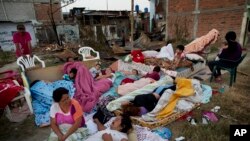International and United Nations agencies are mounting a large-scale emergency operation to assist tens of thousands of people affected by the worst earthquake to hit Ecuador since 1979. The latest figures put the number of dead at more than 400 and the number of injured at more than 2,650.
The disaster has displaced an estimated 40,000 people and the number of dead and injured is expected to rise. The earthquake, which struck northeast Ecuador Saturday, had a magnitude of 7.8.
The government has declared a state of emergency in six of Ecuador’s 24 provinces and has requested international assistance. The worst damage is in the Pedernales area in Manabi province. Aid agencies reportedly are having difficulty in accessing the area because of extensive damage to the roads and infrastructure.
Spokesman for the U.N. Office for the Coordination for Humanitarian Affairs Jens Laerke says the earthquake has been followed by some 300 aftershocks. He says many people are believed to be trapped under the debris.
“The top priority in the response remains search and rescue operations, and local teams continue to search through the rubble in many of the worst hit places in the north of the country ," Laerke said. " Also, International Urban Search and Rescue teams, called USAR teams, from six countries have deployed to Ecuador.”
The government of Ecuador says it has enough medical teams to respond to the emergency. But, the World Health Organization (WHO) says it is assessing needs and is ready to increase medical and surgical personnel, if required.
WHO spokesman Tarik Jasarevic says several staff members are in the country assessing health needs. He tells VOA water-borne diseases are a risk for people who live in crowded places as commonly happens after a disaster.
“I mentioned a couple of viruses that are circulating like Zika, like Chikungunya, because (of) people who live in shelters," Jasarevic said. "So there will be maybe an issue of having more of stagnant water and breeding sites for mosquitoes. It is important to reduce those.”
He says it is important to work with authorities on strengthening disease control around homeless shelters. Latin America is the epicenter of an outbreak of the Zika virus, which is linked to microcephaly, a brain disorder in newborn babies.





